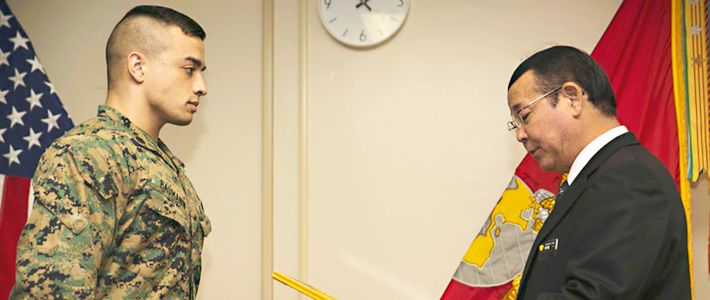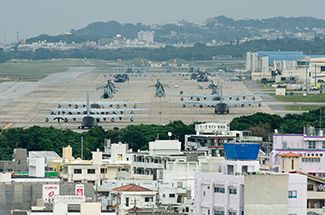
Words to Worry About: The Danger of Media Bias in Okinawa
Politics- English
- 日本語
- 简体字
- 繁體字
- Français
- Español
- العربية
- Русский
A great public debate has erupted recently about the role of the media in Japan: the nation as a whole, more broadly, and specifically about the plight of the “embattled” Okinawan media. In fact, though, the local media in Okinawa is very much at the center and in many cases the cause of this controversy, due to its biased reporting and something I call “miss-information.”
Biased reporting is of course a serious accusation. It can involve an intentional slant to stories, usually promoting a particular agenda while criticizing another, but can also be purposely not reporting events and perspectives that are found to be inconvenient to the chosen cause. Through this control of information, a certain narrative develops.
While this sounds like something free press advocates accuse the government of trying to do, sadly it is being perpetuated in Okinawa by the local media itself—and on a larger scale, by the national and international media stationed in Tokyo.
Bias In Action on Okinawa
On January 14, 2015, I attended a ceremony recognizing a US Marine for saving the life of an elderly Okinawan gentleman who fell from his bicycle onto a busy coastal road on December 23 in Kin Town, in northern Okinawa. The actions of the Marine sergeant, who was on his way to Camp Hansen that afternoon, to get the man out of harm’s way and to resuscitate him were quick-thinking and heroic.
The ceremony was short, simple, and dignified. The commanding officer spoke of heroism, not only in historic and mythic terms, but also in terms of what it means for us as human beings. “The act of a hero,” he said, “is an ordinary man doing extraordinary things for other people,” and applauded the sergeant’s doing what other drivers did not do.
Members of the press were also invited, but despite the fact that the life of a local resident was saved due to the actions of a US service member, surprisingly, the two local newspapers and the broadcast companies were not present.
It was extremely unfortunate that neither the Ryūkyū Shimpō nor the Okinawa Times was there. They received word in advance, and would agree with the Okinawan saying that “life is treasure”—and thus that the saving of a life is deserving of praise and coverage.
In fact, the failure to report about this good story is an example of “miss-information,” the failure—all too often intentional—to report news that is positive. These stories include those about friendships, acts of humanity, good deeds, community relations, and many other aspects of the US military presence or the Japan-US relationship. By not reporting the positive things, the media misportrays the actual relationship that does exist, instead focusing on the negative and sensational.
There were actually several opportunities to report on the story, but there seems to have been a conscious decision to not cover it. The first chance was immediately following the accident, when the police and other first responders were called to the scene. The second was on December 31, when an op-ed written by an eyewitness to the situation appeared in the Okinawa Marine online newspaper; it would also be published in Japanese on January 5. Local media organs regularly follow the information distributed by the US military, although they do not publish most of it.
Finally, the local media would have learned about the story after receiving the advisory inviting them to the ceremony on January 8. Sadly, they chose not to attend the ceremony, report on it, and share the messages that were expressed that day for the benefit of their readers, the US military’s neighbors in Okinawa.
This suggests to me a sad conclusion—that the Shimpō and Times are biased in their coverage of the US forces in Okinawa. This goes against the Canon of Journalism, adopted by the Japan Newspaper Publishers and Editors Association in 2000.
Circling the Media Wagons Nationwide
On June 25, the well-known conservative commentator Hyakuta Naoki, speaking before a study group of about 40 younger members of the ruling Liberal Democratic Party, agreed with a questioner after his talk that the Okinawan media was “indeed dangerous,” adding that “the two newspapers there should be destroyed.”
While he later explained that his comments were in jest, and the discussion moved on to other topics, the Okinawan media, mainland Japanese media, and foreign media in Japan expressed outrage over his remarks. The LDP leadership took immediate action and sanctioned the sponsor of the study group and other members who made comments believed to be offensive. Eventually, Prime Minister Abe Shinzō himself, in part worried about the affect this issue would have on the Diet deliberations regarding the security bills, also apologized to coalition partner Kōmeitō.
What was most surprising, however, about the “Hyakuta Incident” was not his comments. Nor was it the strongly negative reaction of the two Okinawan newspapers—issuing a protest statement, partnering with their business allies such as the Asahi Shimbun to condemn Hyakuta in their editorials, and speaking before gatherings of their recent allies in the Foreign Correspondents Club of Japan. Rather, it was the slowness of people to realize that the media itself was crudely violating a private citizen’s freedom of speech, all in the name of protecting free speech and a free press.
The criticisms blasted the remarks made during the talk as offensive to Okinawa and a threat to democracy, a free press, and the freedom of speech. In none of the critical pieces, though, did the media acknowledge the background to the comments—the presence of biased and intentionally misleading coverage—and their own role in the situation. Rather than seizing upon a good opportunity for self-evaluation, the Okinawan media and their colleagues elsewhere in general have circled the wagons, so to speak, and are firing out indiscriminately in all directions.
Wanted: Robust, Responsible Reporting
As Taira Tetsuo, a resident of Naha, wrote in the commentary section to the Ryūkyū Shimpō on November 6, 2014, “Newspapers are an important public good, and need to be neutral and fair in their stances, based on factual reporting, as the basis for democracy. In order to maintain democracy, we pay a subscription fee to the newspapers, and read them with deep interest and expectations.”
▼Further reading
|
I totally agree with his comment, and am happy that the Shimpō printed it. But I wonder if the editors realized the irony. The two newspapers in Okinawa need to seriously and transparently ask themselves if they are not in violation of the Canon of Journalism and the expectations of the readers.
The media’s irresponsibility, through both commission and omission, in reporting to date is made more severe in Okinawa due to the unapologetic antibase and antigovernment agenda, as well as the existence of a nearly closed media market in Japan’s southernmost prefecture.
I personally have more friends in the media than I do in any other sector of society, with the exception perhaps of academia, where I spent many years. Journalism is a calling for many of these thoughtful, and caring people. I hope these attributes can be further brought out by doing the right thing—reflecting, accepting constructive criticism when it is due (and especially when it is unwelcome), and being open and honest in their reporting.
Some in the media claimed they were “chilled” by the comments voiced by Hyakuta and the members of the LDP study group. However, I was even more chilled at the vengeful power the media demonstrated immediately after the incident. When a private citizen is unable to criticize a media outlet without retribution, what rights do any of us have? The media labeled his remarks a “challenge to democracy,” but to me, the current state of the collusive media represents the bigger challenge. Do we have to be told by the media what to believe? Should they set our parameters for us?
Indeed, I wonder if the media is still aware that it is a power in its own right. The “Fourth Estate” serves as a check on government, hopefully on behalf of the public. Although this isn’t always the case, we remain hopeful that the media will live up to its lofty goals and serve our common wishes and universal concerns, rather than parochial or vested interests.
Unfortunately, we find today a situation in which the media continues to write and report untruths and incorrect facts, reported in a biased manner, often with politically driven agendas.
Responsible Readers Another Key
These issues are not only deeply disturbing to someone who worked closely with the Okinawan local media as an academic, but also are particularly serious in light of the debate going on now in Japan on the role of the press. The media, whether local, regional, national, or international, cannot have double standards. If it does, it further loses credibility.
I write this, perhaps not ironically, on the Fourth of July, a US national holiday celebrating the nation’s Declaration of Independence. Thomas Jefferson, one of the greatest democratic thinkers and a man most noted for his authorship of the declaration, is also well known for his 1787 quote, “Were it left to me to decide whether we should have a government without newspapers or newspapers without a government, I should not hesitate a moment to prefer the latter.”
At the same time, Jefferson knew that the press could also be irresponsible. He warned, “The man who reads nothing at all is better educated than the man who reads nothing but newspapers.” While we still need the media for its depth and breadth of information, we also need to be aware of the excesses and irresponsibility that this same press occasionally (or in some cases, regularly) demonstrates.
The Japan Newspaper Publishers and Editors Association adopted the Canon of Journalism on June 21, 2000, stressing: “Reporting must be accurate and fair, and should never be swayed by the reporter’s personal conviction or bias.” Based on the reporting I have seen to date, many in the media are not living up to these provisions. This situation is especially true in Okinawa. As part of the readership, it is incumbent on us to report these problems.
The sooner the media accepts legitimate and constructive criticism and fixes the problems that ail it, the better we will all be. Otherwise, public trust in the media will continue to decline, alternative means at gathering information will increase, and the scrutiny of the media by the public will deepen.
(Written in English on July 4, 2015. Banner photo: Sgt. Jacob J. Baumann receives a commendation from Nakama Hajime, mayor of the town of Kin, for his rescue of an Okinawan resident on December 23, 2014. © Cpl. Thor J. Larson/III Marine Expeditionary Force and Marine Corps Installations Pacific.)
media Okinawa journalism Hyakuta Naoki Ryukyu Shimpo Okinawa Times bias
 The Okinawa “Base Problem” Today
The Okinawa “Base Problem” Today